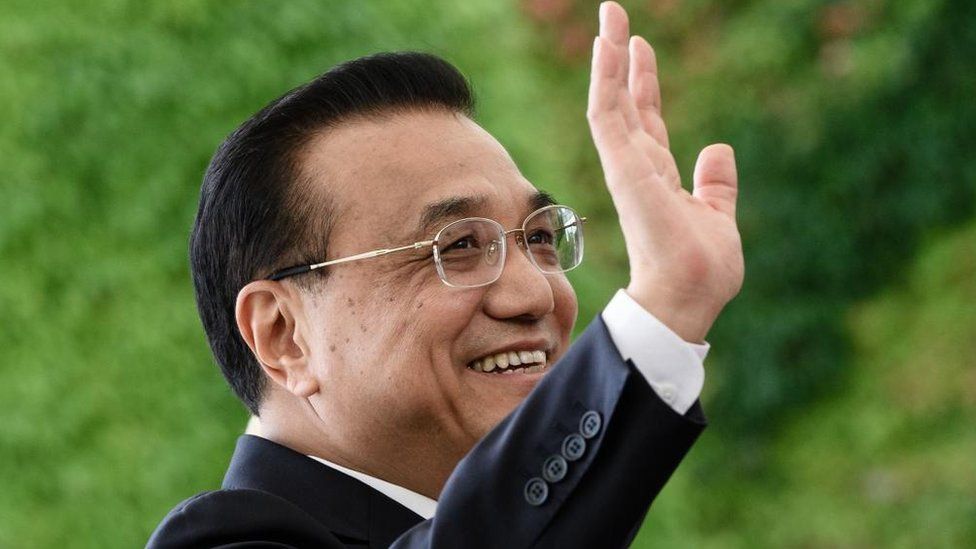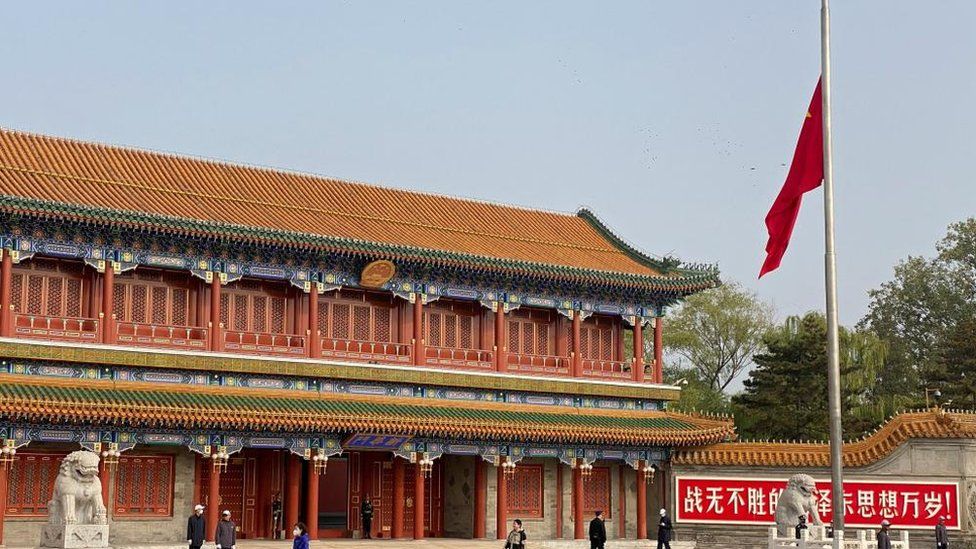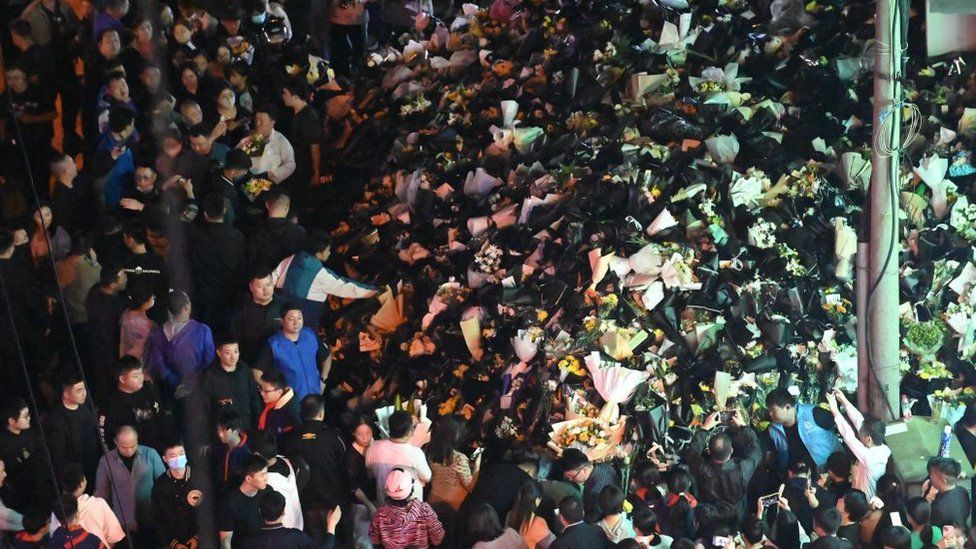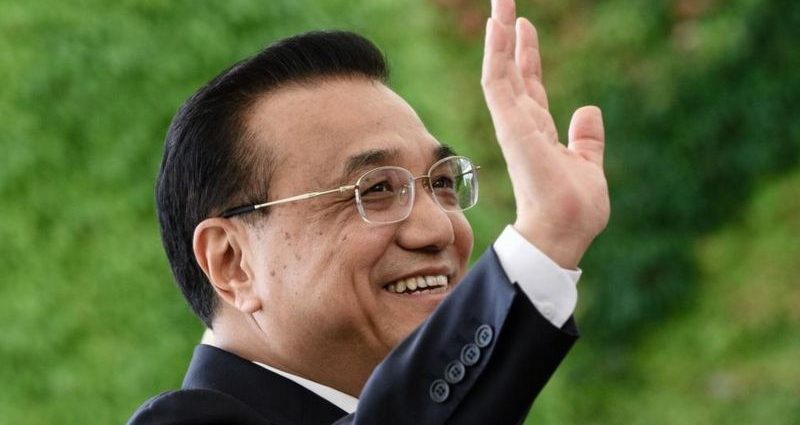
National flags flew at half-mast across China on Thursday as the country put its former premier Li Keqiang to rest.
Li, whose body was moved to Beijing from Shanghai where he had died of a heart attack on 27 October, was cremated.
Pictures show crowds gathered along the streets as a convoy said to be carrying his body drove past.
Muted state coverage of his funeral stands in contrast to the outpouring of sorrow among ordinary Chinese.
Li, 68, was once tipped to be China’s future leader. But he was overtaken and then swiftly sidelined by Xi Jinping, who has centralised power in his own hands during his more than 10 years at the helm.
State news agency Xinhua issued a statement on Thursday afternoon accompanied by a picture of Mr Xi offering condolences to Li’s widow Cheng Hong.
In an obituary published last Friday, China’s Communist Party described Li as a “time-tested communist soldier” and urged the people to “turn grief into strength” and rally around the current leadership of Mr Xi.
Li’s funeral was held at the Babaoshan Revolutionary Cemetery, where his body lay on a bed of flowers and was covered with the Communist Party’s flag. Mr Xi and his wife Peng Liyuan were in attendance, along with new premier Li Qiang and other members of the Politburo Standing Committee, which makes up the top rung of the Party leadership.
Across the country, Li’s sudden death prompted tributes, showing warm praise and grief. While some analysts say Li’s track record as an administrator was uneven, they believe people are mourning as much for the man as the loss of what China could have been under his leadership.
“The public outpouring of grief for Li reflects the mourning of some Chinese people for a more open and optimistic time, before Mr Xi steered the country in a more authoritarian, statist, and nationalist direction,” said Neil Thomas, fellow for Chinese Politics at Asia Society Policy Institute.
He adds that the the public reaction to Li’s death is especially strong because he died soon after leaving office.

Li served as China’s premier for a decade until March this year. A trained economist, he entered Chinese elite politics at the young age of 28 and rose through the ranks to become the youngest provincial governor in China. His ascent in the Party was particularly noted given he had no power base and was not a “princeling” like many Chinese leaders whose fathers were high-ranking officials. Mr Xi’s father, Xi Zhongxun, was the first secretary-general of China’s State Council.
Li was known for being pragmatic rather than ideological in his economic policies, with a focus on reducing the wealth gap and providing affordable housing. But he struggled to implement reforms under Mr Xi, whose leadership saw the party taking a firmer grip of China’s economy, which has increasingly raised concerns among foreign businesses.
Li was best-known outside of China for the Li Keqiang index, a term coined by The Economist to measure China’s true economic growth, after Li described his country’s gross domestic product figures as “man-made” in a private meeting with US officials.
Kyle Jaros, a professor on global affairs at the University of Notre Dame, says the Chinese public tends to feel a closer affinity to premiers whose mandates involve more domestic issues – as was the case with Li who often spoke of China’s challenges, including jobs and cost of living.
In the days since Li’s death, crowds of mourners have laid thousands of chrysanthemum bouquets across the country – including in Zhengzhou, the capital city of Henan where Li once served as the top provincial official, and around his childhood home in the city of Hefei in Anhui province.
Many bouquets had cards bearing Li’s words, including his parting words to the State Council, China’s cabinet, when he stepped down in March: “The heavens are looking at what humans are doing. The firmament has eyes.”
“Sometimes to praise the path not taken is to make a comment on the path that was taken… Li represented a top leader who looked out for the little guys. He made them feel ‘seen’,” says Wen-Ti Sung, a political scientist at the Australian National University who studies China and Taiwan.
By the time he retired, Li was the last of the top Party leadership who was not handpicked by Mr Xi. In an attempt to crush the once-powerful Youth League faction that Li hails from, Mr Xi sidelined him. He left Li and former vice-premier Wang Yang out of the Party’s top decision-making body in a twice-a-decade leadership reshuffle last year.
The decision came days after Xi’s predecessor Hu Jintao, who is part of the same faction, was asked to leave the Communist Party Congress while it was still under way. Mr Hu, 80, patted Li, widely seen as his protégé, on the shoulder as he was escorted out. Li briefly nodded in acknowledgement. Many viewed Mr Hu’s exit as a public display of Mr Xi cementing his hold on power.

There has also been an outpouring of emotion online, despite the authorities’ attempt at managing comments. According to the US-based China Digital Times, which also monitors Chinese censorship, Beijing had ordered platforms and media outlets to “pay particular attention to overly effusive” comments.
In contrast, on Chinese social media platform Weibo, a hashtag related to Li received more than 360 million views and 17,000 comments as of 13:30 local time (5:30 GMT) on Thursday.
Some users commented that this scale of mourning reflects “the highest regard” from the people. “The people know who are really serving them. The premier worked hard. He was too tired,” wrote another Weibo user. Some users described Li as the “people’s premier”, although those comments and the like were swiftly censored.
In Li’s hometown Hefei the BBC encountered difficulty speaking to mourners as local officials and party volunteers interrupted interviews and ordered the crew to leave.
A middle-aged woman who witnessed the commotion told the BBC: “[Li was] a great leader. Why can’t we show it?”
“He’s gone. We are all very sad,” she said and teared up.
While he did not visibly challenge any of Mr Xi’s priorities, prof Jaros says people in and outside of China nevertheless valued his more liberal and less ideological outlook: “He stood as a symbol of a different path that China might have taken.”
Some have labelled Li a “weak premier” who was quickly sidelined, but in death he seems to have become a symbol of quiet opposition to Mr Xi.
Additional reporting by Fan Wang and Ian Tang

